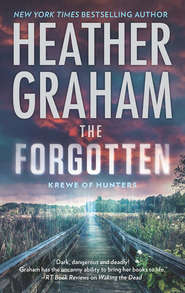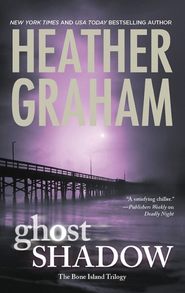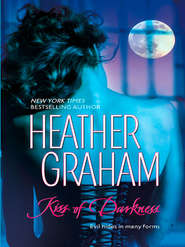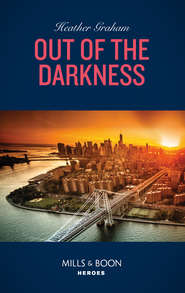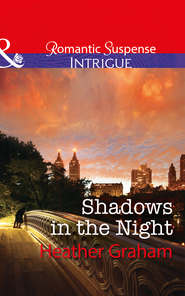По всем вопросам обращайтесь на: info@litportal.ru
(©) 2003-2024.
✖
Haunted Destiny
Настройки чтения
Размер шрифта
Высота строк
Поля
“Okay,” he went on, “you’ve got the two of us here—and you have Jackson Crow and me aboard the ship. Now we need your help. You must remember something, or you couldn’t have known that the Archangel would be on the Destiny. You’re certain of this?”
Byron Grant nodded. He was, minus the stage makeup, a handsome, fit young man who—other than being dead!—seemed somber and sincere. Blue eyes, sandy-blond hair. The boy next door. The kind of guy who’d marry his high school sweetheart.
“I never really saw the killer,” Byron admitted. “He took me pretty quickly.”
“What made you so sure he’d be on the ship?” Jude demanded. “Tell me what happened, step by step.”
Alexi gave Byron an encouraging smile and he smiled back at her. Then he turned to Jude.
“I was doing the play. Anyway, it ended at around 10 p.m. I usually stayed to take off my makeup at the theater, but I got a call from Elizabeth at around ten twenty. She said the lights were off at the house and thought she’d left them on. I told her to wait for me, said I’d leave right away. I got out of my costume, but didn’t bother with the makeup, just grabbed my hoodie and I was out the door.” He frowned as he described what had happened that night. “I phoned her back after I left the theater. She didn’t answer. I probably should’ve called the police right away but I drove home as fast as I could. Her car was in the driveway, and the lights were on in the house. I was a little pissed at her, figuring she’d decided to go in but hadn’t bothered to call me. I walked up to the door, which was unlocked, and threw it open. I got as far as the entry.”
He bit down on his lip and shook his head.
“I saw her. I saw her on the floor,” he said. “I ran over to her, but I was just thinking she’d fallen. Then I saw the blood.”
Alexi lifted a hand as if she’d reach out to comfort him.
She lowered her hand to her lap, her eyes filled with sympathy.
“I hurried to her, bent down...and then he was behind me,” Byron said. “He had a knife at my throat, ripping, even as I tried to turn to see his face. I flailed out at him—got him in the jaw. The knife sliced through my arm when I did that. Defensive wound, I guess they call it. But...I was bleeding out. And I only saw one thing.”
“What?” Jude asked, determined not to let his question sound impatient.
“A ticket. It stuck out from his pocket. He was wearing some kind of suit jacket, pocket on the right. The ticket was for the Destiny—out of NOLA. And this sailing date was on it, so I knew. I knew he’d be on this ship.”
“I see,” Jude murmured. “And then?”
“And then I was dead. I didn’t realize it—or have any awareness of it or anything else—until I seemed to rise over my body where the bastard had stuffed it inside a Dumpster in an alley.”
They were all quiet for a minute.
Jude suddenly blurted, “But you—you were hovering around the crime scene in NOLA. You jumped on a bar. A drunk girl tried to give you money.”
Byron shrugged. “Some people see me. I don’t always know who sees me, though. I tried hitchhiking and eventually found someone who saw me and drove me to NOLA. It’s only a couple of hours, and I don’t think he ever knew I wasn’t...alive. And then...hey, if I hurt that dude who got me to the ship, man, I’m sorry. I don’t want to hurt anyone. I just... I just want to stop more people from being killed.”
Jude let out a long breath, still unable to grasp that he was sitting in Alexi Cromwell’s tiny cabin on the Destiny discussing the case with a ghost—a victim of the killer.
And feeling disturbed by the fact that he did believe he was talking to a ghost.
“We have a list of people who might’ve been in the areas where the women were killed,” he said. “May I show you the pictures, see if any of them seem familiar?”
Byron Grant nodded. “Of course.”
Alexi rose, leaving her perch for Jude. Drawing his phone from his pocket, he slipped by her to sit next to the ghost.
He brushed against her and was startled to feel sparks racing through his system. She was a very attractive woman, and he was feeling a strong physical pull toward her. And that made things more complicated... He held his thoughts in check and carefully displayed the photos Angela Hawkins had emailed him and Jackson; one by one he went through them all.
“I wish I knew,” Byron said. He hesitated. “This guy...”
“This one? David Beach? He’s head of security on the ship.”
“Right. No, you can eliminate him. I’ve seen him. He’s huge. The guy who got me was probably about six feet tall.”
“Good. That helps,” Jude said. He rose and paced the few steps to the cabin door. “Can you think of anything else? A scent—was he wearing aftershave or cologne? Did he smoke? Anything odd about his hands? Did you see his hands?”
He turned back to look at Byron Grant.
But the ghost was gone.
And for a moment he felt absolutely ridiculous, as if he was the butt of a massive joke. He was standing there, talking away, carrying on a conversation with...no one.
An illusion.
Alexi Cromwell was still there, leaning against the wardrobe, eyes enormous.
“He was really here,” she said softly. “Sometimes...well, I think it takes a tremendous amount of energy to appear so...completely and to talk and... He’ll be back.”
He didn’t say anything.
He should have thanked her. He didn’t.
Nodding curtly, he turned and left her room.
There were a few things, unusual things, in his past—like the dead appearing to him—and he was going to have to deal with it all, the then and the now.
* * *
Cruise ships tended to be happy places.
The cruise line did everything possible to ensure that guests were happy; music played constantly, most of it live. Frenetic tour directors carried on bingo parties, pool parties, disco parties and more.
And in the Caribbean, the sun shone down on sparkling water most of the time, shimmering as if the sea were scattered with diamonds. On the Destiny, people seemed to be complying with the cruise “regulation” that they have fun.
Jude needed to go talk to Jackson.
But for a few minutes, he had to be alone, hoping the sweet-salt breeze would wash away the heavy fog of darkness that had settled over his mind.
He left the crew’s quarters, mounting the richly carpeted steps from floor to floor until he reached the top deck and walked aft, leaned against the rail and let the sun soak into him while the breeze swept around him. Neither had any effect on the chill that seemed to have crept into his bones.
Once, in the military, he’d believed that he was experiencing PTSD. Post-traumatic stress disorder. Later in his life he’d used the very situation that sometimes made him think he was crazy to become a crack field officer with the bureau. Only he called it “intuition.” Or talked about “hunches” and “gut feelings” to explain his success at solving crimes.
The Caribbean still rippled with that diamond effect, but Jude stared into a haze of dusty darkness. Time seemed to collapse, and he saw himself seven years earlier, moving with his company in the small village where insurgents had taken hold. Felt the way his heart had thundered that day, the way he’d known he couldn’t see everything, couldn’t see into every home, around every corner.
Some of the soldiers with him had served too long; they shot when something moved—a child, a chicken, a dog, a goat or a pig.
Some still had illusions of morality; they took greater care.
And some, in their desperation to believe in the sanctity of life, died—not firing when they should have.







